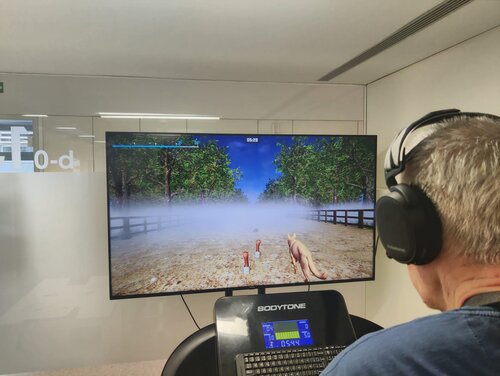Video games, a promising tool in Parkinson's rehabilitation
A research team has reviewed more than 4,000 studies to analyse the use of technologies with gaming elements in the rehabilitation of people with this disease
Video games can help in Parkinson's rehabilitation, but how and why they work needs to be better understood. This is the conclusion of a study carried out by research staff at the University of Lleida (UdL) and the Institute for Research in Biomedicine and Biomedicine (IRBLleida). The research has been published in the journal JMIR Serious Games.
The research team from the GReCS and GESEC research groups, with the collaboration of staff from the University of Turku in Finland, has reviewed more than 4,000 studies to analyse the use of technologies with game elements in the rehabilitation of people with Parkinson's disease. The results show that video games are a promising tool, but are still used without a clear theoretical basis.
The study highlights the need to design more grounded interventions that do not only use commercial video games, but also incorporate gamification elements specifically designed for the needs of each person. With this approach, technologies could contribute more effectively to improving treatment adherence and quality of life for people with Parkinson's disease.
Parkinson's disease is a neurological condition that affects an increasing number of people worldwide. Among the usual treatments, physiotherapy and physical exercise have proven to be effective in alleviating motor symptoms. One possible solution is video games and interactive applications that make rehabilitation a more engaging experience. This strategy is known as gamification, i.e. the use of game elements - such as points, levels or rewards - in non-game contexts, such as health.
The most common are progress tracking, points, and levels or stages of achievement. Other resources such as badges, rankings or personalisation options also appear. Even so, the authors warn that, in many cases, these elements are applied without prior reflection on what psychological mechanisms are to be activated to motivate people.
'Technology can be very useful to make rehabilitation more attractive, but we need to better understand how these game elements actually work and what response they elicit in people with Parkinson's,' explain the authors of the review.
This research has been made possible thanks to funding from the Instituto de Salud Carlos III and the European Regional Development Fund/European Social Fund 'A way to make Europe'/'Investing in your future').
Article: Bosch-Barceló P, Martínez-Navarro O, Masbernat-Almenara M, Tersa-Miralles C, Pakarinen A, Fernández-Lago H. Gamification Integration in Technological Devices for Motor Rehabilitation in Parkinson Disease: Scoping Review. JMIR Serious Games. 2025 Jul 4;13:e69433. doi: 10.2196/69433. PMID: 40614259.

The results show that video games are still used without a clear theoretical basis






